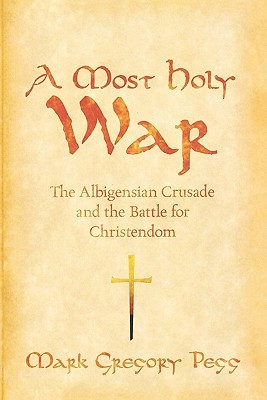Kimberly's Reviews > A Most Holy War: The Albigensian Crusade and the Battle for Christendom
A Most Holy War: The Albigensian Crusade and the Battle for Christendom (Pivotal Moments in World History)
by

by

A Most Holy War: The Albigensian Crusade and the Battle for Christendom by Mark Gregory Pegg is an attempt to address misconceptions regarding the Cathar heretics and modern portrayals of them. Pegg makes a strong case that the Cathars never existed, and that the twenty year long crusade in Southern France was a crusade against Albigensian heretics in a very specific geographic area. He has a very negative view towards past histories of these events, and he criticized the sources used in previous scholarship.
Pegg wrote that the Albigensian Crusade was a central event in the Middle Ages. It was the first time a pope called a crusade against Western Christians by declaring them heretics. Christians fought Christians, those who fought for the Pope were promised salvation and the heretics were killed for their unorthodox beliefs. He links the brutal crusade with the medieval mindset, propagated by the Church, in which heretics should be feared and hunted down because they appear so similar to orthodox Christians as to be indistinguishable but in reality they are a dire threat all of Christendom. Crusaders no longer had to travel to the Holy Land in order to receive absolution for sins; a campaign in France was an easier route to the same objective.
While Pegg states that there was a “moral obligation for mass murder,” the Pope was not telling everyone to go to France and kill heretics. There actually seemed to be some hesitation by the public to join this crusade, as Simon de Montfort had to resort to using mercenary armies. Pegg also tries to link the Albigensian Crusade with Christ’s sacrifice on the Cross, and that those who fought fellow Christians were imitating Christ. That connection was a stretch considering that Christ did not advocate violence, especially not against one’s co-religionists.
Pegg also stated that, “The Albigensian Crusade ushered genocide into the West by linking divine salvation to mass murder.” He then went on to describe six narrow categories with which to define genocide so that it fits his concept of the Albigensian Crusade. Redemptive homicide against one’s heretical neighbor became acceptable crusade practice and added another enemy to the list of acceptable crusading targets.
The chapters where Pegg described the heretics and some of their practices might be difficult for some readers to follow. Those sections seemed overly repetitive and drawn out to ensure the reader got the point. Good men and women were named and their societal and religious practices were explained. Stylistically the rest of the book flowed rather well and the reader will not get slowed down even though there is twenty years of history to read through before the end.
Pegg provides a book which is easy to read and which sheds some new light on the subject of the Albigensian Crusades. He provided sources which support his thesis and does not utilize contradictory evidence. However his personal disregard for past scholarship and inability to remain unbiased in his writing, his emphasis on genocide, and calling the crusade an imitation of Christ detracted from the credibility of the book.
Pegg wrote that the Albigensian Crusade was a central event in the Middle Ages. It was the first time a pope called a crusade against Western Christians by declaring them heretics. Christians fought Christians, those who fought for the Pope were promised salvation and the heretics were killed for their unorthodox beliefs. He links the brutal crusade with the medieval mindset, propagated by the Church, in which heretics should be feared and hunted down because they appear so similar to orthodox Christians as to be indistinguishable but in reality they are a dire threat all of Christendom. Crusaders no longer had to travel to the Holy Land in order to receive absolution for sins; a campaign in France was an easier route to the same objective.
While Pegg states that there was a “moral obligation for mass murder,” the Pope was not telling everyone to go to France and kill heretics. There actually seemed to be some hesitation by the public to join this crusade, as Simon de Montfort had to resort to using mercenary armies. Pegg also tries to link the Albigensian Crusade with Christ’s sacrifice on the Cross, and that those who fought fellow Christians were imitating Christ. That connection was a stretch considering that Christ did not advocate violence, especially not against one’s co-religionists.
Pegg also stated that, “The Albigensian Crusade ushered genocide into the West by linking divine salvation to mass murder.” He then went on to describe six narrow categories with which to define genocide so that it fits his concept of the Albigensian Crusade. Redemptive homicide against one’s heretical neighbor became acceptable crusade practice and added another enemy to the list of acceptable crusading targets.
The chapters where Pegg described the heretics and some of their practices might be difficult for some readers to follow. Those sections seemed overly repetitive and drawn out to ensure the reader got the point. Good men and women were named and their societal and religious practices were explained. Stylistically the rest of the book flowed rather well and the reader will not get slowed down even though there is twenty years of history to read through before the end.
Pegg provides a book which is easy to read and which sheds some new light on the subject of the Albigensian Crusades. He provided sources which support his thesis and does not utilize contradictory evidence. However his personal disregard for past scholarship and inability to remain unbiased in his writing, his emphasis on genocide, and calling the crusade an imitation of Christ detracted from the credibility of the book.
Sign into Goodreads to see if any of your friends have read
A Most Holy War.
Sign In »


